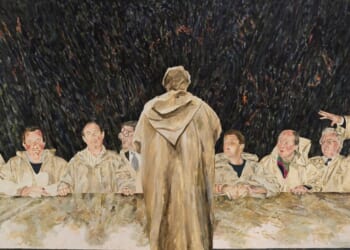EVERYTHING whirls so fast in the news these days that you have probably forgotten the assault on the BBC for editing a clip of President Trump’s speech before his supporters stormed the Capitol building to make it appear that he had actually said what they heard him to mean — and what he undoubtedly meant. That was last week’s news and, indeed, last week’s column.
But, since then, a couple of pieces have appeared that highlight an unusually powerful journalistic technique — that of not actually trusting what other journalists say. In particular, if you’re going to comment on a long and complex report, you should take the time to read it, and think carefully about what it says and, just as important, what it does not say. Everything that has changed in journalism since it moved online militates against this practice. The faster and more visual news becomes, the more the story seems fixed, even before you start writing.
It is obvious that most of the people who wrote about Michael Prescott’s report — the one that dynamited the BBC hierarchy with its accusations of bias — had not in fact read it, or not read more than the juicy bits. The skill of filleting slabs of prose for the meatiest quotes is essential and enjoyable. This is clearly understood by the people who write reports, who try to ensure that they are larded with sound-bites. None the less, we who fillet need to notice the bits that we don’t use, and to understand how they are connected to the tasty parts.
In this context, the former Times columnist David Aaronovitch, whom I knew when he was a leader writer on The Independent alongside Yvette Cooper, did an exemplary job, on his Substack, on the Prescott report.
Aaronovitch believes that the disputed Panorama edit was grave journalistic malpractice. This seems absurd to me, because, as a print journalist, we must often rearrange what people say to convey what they meant instead: the trick is to do so in ways that they will recognise and accept. This, of course, presupposes that the people we are checking with are not trying too grossly to manipulate us and are working in good faith. That isn’t always entirely true. So, once more, we, as readers, are thrown back on our knowledge and trust of particular journalists. Since Aaronovitch has been a TV journalist and I have not, I’ll assume that there are good reasons for his judgement.
He has actually read the Prescott report, though, and notice what it doesn’t say: “There is not a single word here about the BBC’s political, business, education, health, royalty, home affairs, climate change or crime coverage, or even Ukraine,” as well as what it does say: “Prescott went way further than the Panorama edit. His letter charges that the BBC’s entire coverage of the 2024 election was biased against Trump. And his objections range from the debatable to the downright partisan.
“Prescott argues that BBC News put too much emphasis on the passage in the single Trump/Harris debate where Trump repeated a racist urban myth, propagated by his running mate JD Vance, that pets were being eaten by Haitian migrants. I think reasonable people can be forgiven for agreeing with the BBC on that one.”
BUT not even Aaronovitch had compared Prescott’s edit of Trump’s remarks with the raw feed presumably still available on YouTube. James Ball, in The New World, had actually done so. He discovered that Prescott had himself grossly misrepresented the Trump quote that he accused Panorama of distorting: he had left out, for example, the phrase “You’ll never take back our country with weakness. You have to show strength. You have to be strong. We have come here to demand that Congress do the right thing.”
I asked him how long it had taken to establish these facts so important to the story: “This one was really easy, which makes it all the more disturbing that no one had done it before me.” And, of course, by the time he published, the crisis was over, and the damage had been done.
A year ago, and in a different context, the same dynamic was played out with the Makin report. Very few of us, I sometimes think, ever bothered to read the report and ask whether it showed what it claimed to show — which it did not. Prescott, I think, intended his report to serve as a weapon to the enemies of the BBC. Makin may simply have blundered.

















